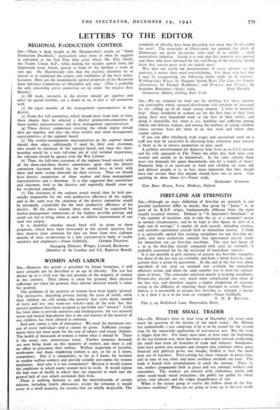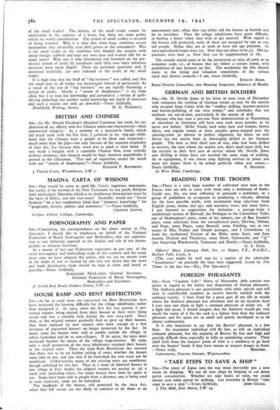THE SMALL TRADER
Snr,—Mr. Hinton's letter in your issue of December 5th raises once more the question of the destiny of the small trader. Mr. Hinton has undoubtedly a just complaint if he is to be ruined for the second time by the inexorable application of war-service acts. But the issue is bigger than this For many years now, at least since the beginning of the last German war, there has been a movement towards eradicating the small man from all branches of trade and industry Amalgama- tions have grown into mergers and mergers into combines whose great financial and political power has bought, bluffed or bust the small man out of business. Price-cutting has been rampant in peace-time, and in time of war (Alex and more insidious methods are used. The hook is baited with rationalisation to catch the unwary. There is, too, endless propaganda both in peace and war amongst workers and consumers. The workers are enticed with clubrooms, sports and other ready-made social attractions; the public are gulled by cheap prices, trite phrases and the vulgar magnificence of size.
When is the nation going to realise the hollow sham of the big- business combine? When are we going to wake up to the real worth of the small trader? The defenc. of the small trader cannot be undertaken in the compass of a letter, but there are some points which are worth consideration The system of small traders is accused of being wasteful. Why it is then that when huge combines secure monopolies they invariably raise their prices to the consumers? Was it the small trader or the combines who flooded the country with cheap foreign rubbish and kept our own men and women idle for so many years? Who was it who introduced and battened on the per- nicious system of credit by instalment until their own more nefarious practices were made illegal? These are pertinent questions and, if answered truthfully, can only redound to the credit of the small trader.
It is high time that the bluff of " big business " was called, and that the small man in all trades .vas encouraged instead of persecuted. As a result of the rise of " big business " we are rapidly becoming a nation of clerks. Maybe a " nation of shopkeepers " is far from ideal, but it at least has knowledge and personality; a nation of quill- driving underlings has neither useful knowledge nor depth of character and such a nation can only go downhill.—Yours faithfully,























 Previous page
Previous page